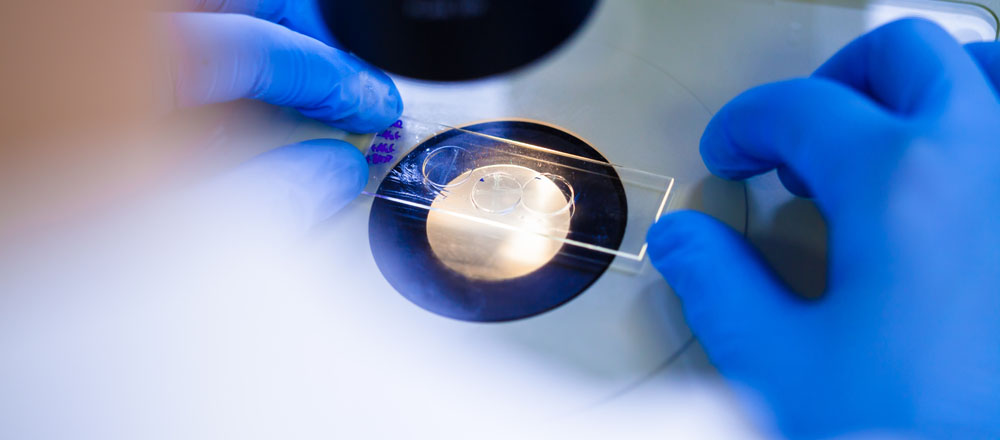
Penn Dermatology is one of the top funded research departments in the nation in National Institutes of Health (NIH) funding. Its world-renowned faculty and investigators conduct cutting-edge basic research and clinical trials and publish in the world’s leading dermatologic journals on skin, hair and nail disorders and diseases.
Faculty and investigators within the Department of Dermatology at the University of Pennsylvania have broad research interests, from basic science research related to dermatology and skin diseases, as well as translational research and clinical trials.
Research areas within the Department of Dermatology at the University of Pennsylvania fall into four categories:
Basic Science Research
- Epigenetics
- Histone deacetylases
- In vivo live imaging
- Alopecia
- Antibodies
- Appendageal Tumors
- Atopic Dermatitis
- Autoantibodies
- Autoimmune Disorders
- Blistering Diseases
- Breast Cancer
- Cell Adhesion
- Cell Proliferation and Differentiation
- Chronic Wounds and Leg Ulcers
- Connective Tissue Disorders (Lupus)
- Cutaneous Aging
- Cutaneous T-Cell Lymphoma
- Dental Development
- Dermatologic Surgery
- Desmosome
- Developmental Biology
- Dysplastic Nevi
- Epidemiology
- Epithelial stem cells
- Extracellular Matrix
- Gene Therapy
- Guidelines of Care
- Hair and Scalp Disorders
- Hair Follicle Biology
- Hair Growth
- Host-pathogen Interactions at the Skin Surface
- Immunodermatology
- Immunotherapy
- Infectious Disease
- Innate Immunity
- Mammary Gland Biology
- Melanoma and Melanocytic Lesions
- Metagenomic Analysis of Microbial Communities in Skin Health and Disease
- MicroRNAs in Mammary Gland Development
- MicroRNAs in Skin Development and Disease
- Mohs Micrographic Surgery
- Mouse Models of Human Diseases
- Mycosis Fungoides
- Non-Melanoma Skin Cancer
- Novel Therapies
- Observational Studies
- Oral Cancer
- Outcomes Research
- Pemphigus
- Photoimmunology
- Photopheresis
- Phototherapy
- Pigmented Lesions
- Precancerous Non-Melanoma
- Psoriasis
- Regenerative Medicine
- Scleroderma
- Signal Transduction
- Skin Cancer
- Src Family Tyrosine Kinases
- Srcasm
- Stem Cells
- Sun Damage
- Tooth Development
- Tropical and Infectious Dermatology
- Vitiligo
- Wnt Signaling
- Wound Healing
- Wound Repair
Clinical Research
Penn Dermatology is known worldwide for its long history, exceptional leadership and significant work in conducting clinical research and clinical trials involving the skin, hair and nail diseases. Clinical studies have included the analysis of investigational new drugs and devices for cutaneous T-cell lymphoma, psoriasis, skin cancer, atopic dermatitis, sarcoidosis, acne, hidradenitis, hair disorders and many others.
- Acne and rosacea
- Atopic dermatitis
- Autoimmune diseases
- Clinical trials
- Contact dermatitis
- Cosmetic dermatology
- Cutaneous aging
- Cutaneous imaging
- Cutaneous lymphoma
- Genetic skin disease
- Guidelines of care
- Hair and scalp disorders (alopecia)
- Infectious disease
- Melanoma and melanocytic lesions
- Non-melanoma skin cancer and precancerous
- Pediatric dermatology
- Psoriasis
- Sarcoidosis
- Tinea capitis
- Travel/tropical acquired diseases
- Vitiligo
- Wound healing
Dermatoepidemiology
The department of dermatology at the University of Pennsylvania has a long tradition and rich heritage of innovative research. Nationally, clinical and epidemiological research in dermatology has lagged behind other fields. Penn Dermatology, however, is an international leader and at the forefront of the epidemiological investigation of melanoma and wound care. In addition, Penn’s dermatologic research is the center for the development of epidemiological methods and training relevant to all areas of cutaneous research.
- Prognostic models of treatment outcomes of chronic wounds
- Gene therapy of chronic wounds
- Improvements in melanoma prognostic modeling
- Redefining the natural history of common chronic diseases such as acne, psoriasis, cutaneous lupus, dermatomyositis and atopic dermatitis
Translational Research
Penn’s department of dermatology participates fully in a new and evolving area of study called translational research. In fact, Penn Dermatology recently initiated The Center for Dermatoepidemiology and Translation (CDET), directed by David Margolis, MD, PhD.
The Center’s goal is to become the world’s leading center focusing on cutaneous epidemiological research and clinical evaluation aspects of translational research.
According to the NIH, translational research is an approach where scientific discoveries must be translated into practical applications to improve human health. The research aims to move discoveries more quickly from “bench” to “bedside.” Through translational research, the NIH notes that basic scientists provide clinicians with new tools for use in patients and for assessment of their impact, and clinical researchers make novel observations about the nature and progression of disease that often stimulate basic investigations.
Read more about the Center for Dermatoepidemiology and Translation (CDET)
The Institute for Translational Medicine and Therapeutics (ITMAT) launched in 2005 at Penn. ITMAT is the first institute of translational medicine in the world and includes investigators focused on clinical and translational research in all schools at Penn, including the department of dermatology, the Children's Hospital of Philadelphia, the Wistar Institute, the Monell Institute and the University of the Sciences in Philadelphia.
In 2011, Penn Medicine opened the Translational Research Center (TRC) – a new home for Penn Medicine's emphasis on translating breakthroughs in the lab to clinical therapies for patients.
The Autoimmune Disease Study Unit led by Victoria Werth, MD, conducts translational research in rare autoimmune disorders.